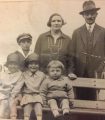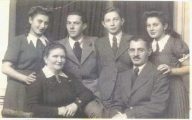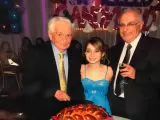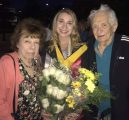- Local Survivor registry
- MIKE JUCOWICS
- Local Survivor registry
- MIKE JUCOWICS
Survivor Profile
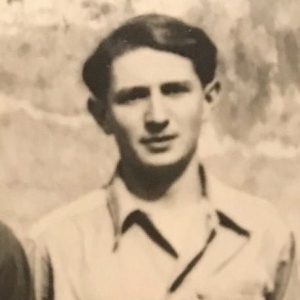
MIKE
JUCOWICS
(1925-2020)
PRE-WAR NAME:
JUCOWICS
JUCOWICS
PLACE OF BIRTH:
MUKACEVO, CZECHOSLOVAKIA
MUKACEVO, CZECHOSLOVAKIA
DATE OF BIRTH:
MONTH/DAY, UNKNOWN, 1925
MONTH/DAY, UNKNOWN, 1925
LOCATION(s) BEFORE THE WAR:
MUKACEVO, CZECHOSLOVAKIA
MUKACEVO, CZECHOSLOVAKIA
LOCATION(s) DURING THE WAR:
MUKACEVO, HUNGARY; MUKACEVO GHETTO, AUSCHWITZ; FUENFTEICHEN CONCENTRATION CAMP; KRUPP LABOR CAMP
MUKACEVO, HUNGARY; MUKACEVO GHETTO, AUSCHWITZ; FUENFTEICHEN CONCENTRATION CAMP; KRUPP LABOR CAMP
STATUS:
SURVIVOR
SURVIVOR
RELATED PERSON(S):
ESTHER JUCOWICS - Spouse,
BELLA JUCOWICS- SISTER (Deceased),
WILLIAM JUCOWICS- BROTHER (Deceased),
SIDI JUCOWICS-SISTER (Deceased),
IMRE JUCOWICS- BROTHER (Deceased),
YOSKOKA JUCOWICS-BROTHER (Deceased),
MICHELLE WEINFELD - Granddaughter,
BEN WEINFELD-GRANDSON
-
BRIEF biography by mike jucowics, survivor
My name is Mike Jucowics. I was born in Mukacevo, Czechoslovakia in 1925. I lived with my parents, brother, two sisters and my mother’s father. I had numerous cousins, aunts, uncles and other family living close by. My father was a Regional Tax Collector. He had been a decorated officer in the Hungarian Army. Czechoslovakia was a democratic society, and Jews had full rights. We lived a comfortable life in Czechoslovakia until 1938, and then everything changed.
It started with the famous Munich Peace Treaty. The Munich Peace Treaty redrew the borders and cut Czechoslovakia into pieces. Hungary occupied the part of Czechoslovakia where we were living, Mukacevo. Problems started for the Jewish people right away. Hungary had a 6% Jewish population, so the Hungarian government enacted a law which limited Jewish participation to 6% in all aspects of life. This included businesses, schools, etc. Anti-Semitism and propaganda became more widespread. On the radio, anti-Jewish jokes became commonplace. Still, life went on. My father was able to maintain his job because of his heroism in the Hungarian Army. The problems escalated when Germany invaded Poland. The Hungarian government took the Jewish boys of army age to forced labor camps to work in the mines. I lost my brother in the mines. Many other Jewish boys were sent to the front line. They were to go ahead of the German and Hungarian Armies to clean the fields and pick up mines on the front line. I lost 3 cousins in the operation. Some of the Jewish people were sent to Galizia, Poland, which was under German occupation. I never saw any of them again.
The conditions prior to the German occupation of Hungary were tolerable for the Jews, even with the anti-Jewish laws. It wasn’t a picnic, but we could live in our own homes and go about our business, as much as possible. When the Germans marched into Hungary, the Germans put us into ghettos and made us wear yellow stars. My father who had been working until this point, lost his job. The Germans did not recognize my father’s past heroism. All the Jews were forced from their homes to live in the Ghetto. We were 6 people in 1 room. Food was scarce and life was very scary. There were no schools for the Jewish children. We were cut-off from normal living. My family lived in the ghetto for a while. They marched us like cattle to the brick factory. People who dropped out were shot. We stayed in the brick factory for about a week. We slept on the floor, with no food or anything. We were then loaded onto a train, with hardly standing room for 2 days. There was no food, no water. The train eventually took us to Auschwitz, where we were separated. The old and very young were sent to the gas chambers immediately. That was the last time I saw my mother.
I stayed in Auschwitz for a few days. Eventually the rest of us were sent to different concentration camps, here I was separated from my father. I never saw him again. My cousin and I were sent to Fuenfteichen, there they shaved a mark on our heads every week. I was number 42716. This was a labor/concentration camp. I worked 7 days a week from very early to late at night in a munitions factory named Krupp. There was a lot of heavy work, with little food and water given to the Jews. Every morning we were marched to the factory with hardly any shoes or clothing during the wintertime. I was there until the Russians occupied that part of Germany. When news that the Russians were closing in came, the camp was evacuated. When the Germans told us to go stand in the line, my cousin and I managed to hide. We knew it was going to be a march of death, so we gambled. The gambling paid off. Most of the prisoners were taken on a death march from the camp, walking so many kilometers a day without food or water. Most of them didn’t make it.
My cousin and I hid in the camp and were liberated 4 days later. My cousin and I began to walk home, or at least to what we thought was home. It took us almost 8 weeks. We walked from Fuenfteichen, which was in Germany, towards the Polish border. The part of Germany we walked through was completely evacuated. The Germans left their homes very quickly, leaving behind all their possessions. My cousin and I slept in a different house and town every night. We changed from the labor camp uniforms to civilian clothing we found. When we went back to my home, the whole house was destroyed. One of my previous gentile friends told me who had most of our belongings. I was young and not too bright. I went to the person to take back my things that he had taken from us. He said you want your things, so he came back with a rifle and asked if I wanted my thing. He called me a dirty Jew and told me to get out of here. I stayed in Mukacevo with my other cousins for a few weeks, then my sister came back from Germany and I left forever. I first went to Budapest. My sisters stayed there. I then went to Prague, from Prague I went back to Germany to American occupied territories, where I ended up in a Displaced Persons Camp (DP camp). From there I emigrated to the United States.
Editor’s Note:
Refer to Historical Notes and Voices of the Descendant’s Registry to read Michelle Weinfeld’s interview and read her grandfather “Poppy’s” complete story.
-
SURVIVOR INTERVIEW:
Refer to Interview with Michelle Weinfeld, granddaughter in Voices of the Descendant’s Registry. Also refer to Michelle Weinfeld’s book, From Generation to Generation : A Memoir of Food, Family and Identity in the Aftermath of the Shoah.
-
HISTORICAL NOTES:
Munkács Ghetto (Aternate Names: Mukachevo Ghetto) Munkacs Ghetto)
Ghetto established in April 1944 for the purpose of preparing the city’s Jewish population for deportation. Most were deported to Auschwitz.
Krupp Factory Under the Nazis
Adolf Hitler and the Nazis seized power in Germany in 1933. Hitler launched on a massive armament program. The Krupp complex was key to German rearmament. Krupp arms were vital in German military victories during the early years of World war II. Krupp was one of the largest industrial combines in Germany and a recipient of slave labor from Auschwitz during the war. During the war, Krupp employed more than 70,000 foreign civilians and 23,000 prisoners in more than 80 different plants, including about 10,000 prisoners from the concentration camps.
-
Sources and Credits:
Sources:
Mike Jucowics, written testimony submitted in his own words by Michelle Weinfeld, granddaughter. Digital historic and family photographs donated by Michelle Weinfeld from her book, From Generation to Generation: A Memoir of Food, Family and Identity in the Aftermath of the Shoah.


